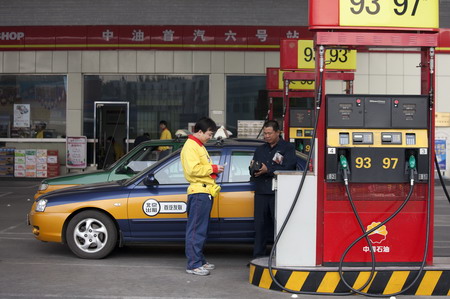Energy
Domestic fuel prices are hiked
Updated: 2011-04-07 09:40
By Wang Xing, Huang Ying and Du Juan (China Daily)
|
 |
|
A man pays for gasoline at a PetroChina Ltd gas station in Beijing. The gasoline and diesel prices hike in China is the fifth since the beginning of 2010 . [Photo / Bloomberg] |
Experts say the rise may affect the government's fight against inflation
BEIJING - China will raise the domestic price of gasoline and diesel as of Thursday. The move comes as international oil prices have been forced higher by recent unrest in the Middle East and rising demand as the global economy recovers from the financial crisis.
On Tuesday, the international oil price rose to a two-and-a-half-year high, with Brent crude hitting $120 a barrel.
Industry analysts said the move will put additional pressure on China's inflation battle and could impede the country's economic expansion.
The National Development and Reform Commission (NDRC), the country's top economic planner, said the domestic wholesale price of regular gasoline will rise by 500 yuan ($76) for each ton, or an extra 0.37 yuan per liter. Diesel prices will be lifted by 400 yuan a ton or 0.34 yuan for each liter. It's China's second fuel price rise this year and the fifth hike since the beginning of 2010.
On Wednesday, Cao Changqing, head of the price department at the NDRC, admitted at a news briefing that the price surge will add a "certain" pressure to domestic inflation, but noted that the major State-owned oil producers can no long afford the increasing gap between domestic and international oil prices.
He also said the government will provide subsidies for the low-income groups such as farmers, bus companies and taxi drivers.
Under China's current pricing mechanism, the NDRC has the right to adjust the fuel price if a basket of crude prices rises by more than 4 percent in a period of 22 working days. Since China's last oil price adjustment on Feb 19, the price of Brent crude has risen by more than 15 percent.
On Wednesday afternoon, hours before the government's announcement, there were rumors on the Internet. That resulted in many consumers lining up at gas stations.
At a Sinopec gas station near the North Fourth Ring Road in Beijing, Tian Yuanyuan, who works for a private company, said the surging price of oil has become a daily burden. "If the price of gas continues to rise, I will sell my car immediately because no one can afford to drive anymore," said Tian, who drives to work every day because of the distance between her home and workplace.
Zhang Lijun, who operates a small business in Beijing, also complained about the price surge. "China's public transport system is not as advanced as that in Japan, and people want to drive under certain circumstances," he said, adding that he only drives when he has to go outside the Fourth Ring Road, but travels by bus or the subway within the Fourth Ring.
|
||||
China Petroleum & Chemical Corp, China's biggest oil producer by sales, also said in March that its 2010 full-year net profit rose 14 percent, as higher oil prices and fuel sales offset lower refining margins.
"The public anger is understandable, but the recent uncertainty in Libya and some Middle Eastern countries also pushed up the international oil price, which has inevitably affected the Chinese market," said Lin Boqiang, director of the Center for Energy Economics Research at Xiamen University. Liu said a possible solution would be for the government to cut oil taxes to help reduce prices.
Zhuang Jian, a senior economist with the Asian Development Bank (ADB), said the price rise will have some negative effect on the nation's consumer price index and GDP growth for the rest of this year.
ADB said in an annual report released on Wednesday that China's economy is expected to grow 9.6 percent in 2011, as fixed asset investment remains a key driver.
Cao from the NDRC said that if taxes - which analysts said account for as much as 30 percent of the total oil price - are excluded, the price of domestic refined oil is the lowest compared with the world's major economies.
Specials

Share your China stories!
Foreign readers are invited to share your China stories.

Art auctions
China accounted for 33% of global fine art sales.

Waiting for drivers' seat
Lack of sponsorship appears to be why Chinese drivers have yet to race in a Formula 1 event



